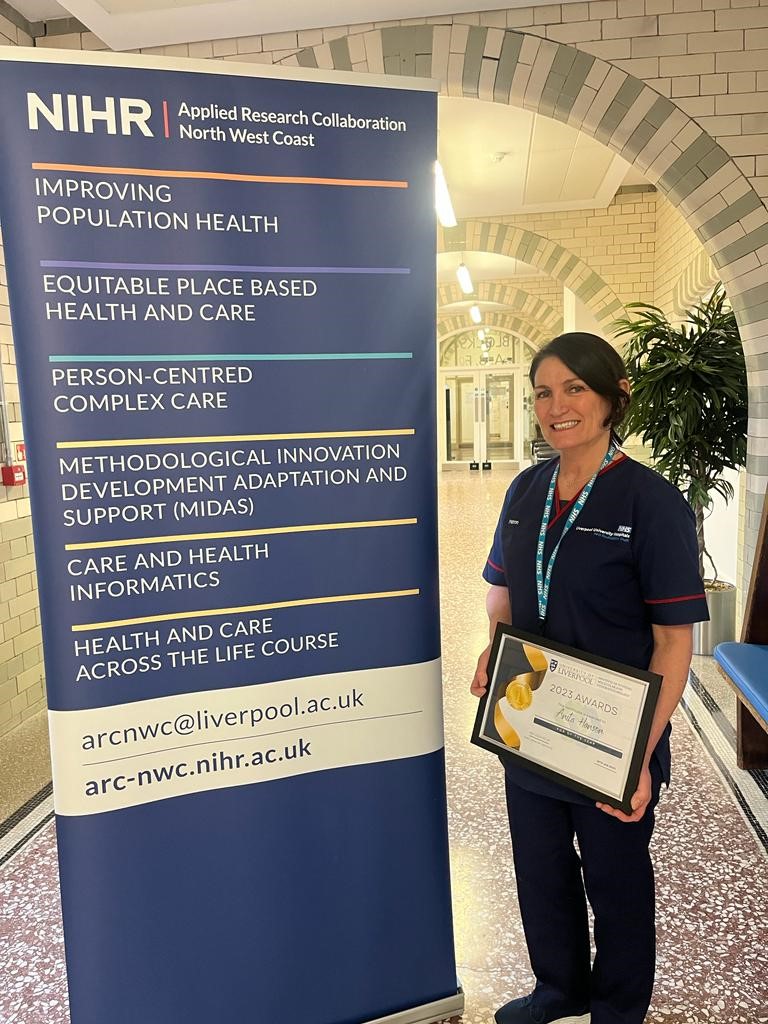A passport to success for improving the detection and reporting of adverse drug reactions
By Anita Hanson, Research Matron and Lead Research Nurse for Clinical Pharmacology at Liverpool University Hospitals NHS Foundation Trust (LUHFT) and the University of Liverpool.

Early this year I was very privileged to receive a ‘Post Graduate Researcher (PGR) of the Year Award’ for work completed as part of my PhD, which was funded by CLAHRC NWC and continued into ARC NWC. My thesis explored strategies to improve the detection and reporting of adverse drug reactions (ADRs) and involved the implementation of the Liverpool ADR Causality Assessment Tool (LCAT) in a real-world setting. Healthcare professionals evaluated the tool, which has great potential to improve the identification and diagnosis of ADRs, for its clinical utility and acceptability across two local NHS Trusts.
Overall, the findings were extremely positive and showed evidence of acceptability and utility. Healthcare professionals welcomed a more structured, systematic approach to ADR assessment and thought the tool would be useful in clinical practice. The LCAT was described as a helpful prompt that aided the identification of ADRs, which could in turn enhance reporting through the Medicines and Healthcare products Regulatory Agency (MHRA) Yellow Card scheme. The findings also highlighted that the LCAT would be more accessible in the form of an app. As such, the LCAT app was developed and is now at the evaluation in clinical practice stage. This is an exciting development. The app has potential to enhance utility, and support the early identification of ADRs and improve how we treat patients with medicines.
The early detection and reporting of the more serious ADRs such as Stevens-Johnson Syndrome (SJS) is extremely important to ensure the best clinical outcome for patients. SJS is a rare but life-threatening condition, sometimes caused by a viral infection but more commonly drug induced. The reaction is typically characterised by blistering to the skin and mucous membranes, affecting a variable percentage of body surface area. Patients can experience multiple acute complications and as such, are often treated in an intensive care setting or a regional burns unit. Long-term morbidity is considerable and includes vision loss, disfigured painful skin, and chronic respiratory, urogenital and oral complications. Survivors also experience a reduction in quality of life and suffer with psychological problems with a risk of developing Post Traumatic Stress Disorder. A multidisciplinary approach to care post discharge is therefore required.
Over ten years ago, I set up a Patient & Public Involvement (PPI) group at the Wolfson Centre for Personalised Medicine, which is largely attended by survivors of SJS. Working alongside the ‘SJS Awareness UK’ charity, founded by Nadier Lawson, the PPI members recognised the need for a tool to not only support their healthcare management and multidisciplinary consultations post discharge, but to raise awareness of such reactions amongst healthcare professionals. To address this unmet need, I led and supported the group in the co-production of the ‘My SJS Passport’. As part of my PhD, the passport was evaluated through a proof of concept study. Results highlighted striking findings suggesting the tool would have a positive impact and improve health outcomes and experiences for patients, albeit with minor modifications to enhance its acceptability and utility. Patients from across the globe have expressed an interest in the passport and have requested a copy for personal use. I am excited to publish the results and proceed with the minor modifications to enhance the passport according to the findings from my research.
Although there is a published SJS guideline by the British Association of Dermatologists (BAD) to provide up-to-date, evidence-based recommendations for diagnosis and management during the acute phase of the disease, there is no standard practice to support patients with the management and coordination of their long-term health complications. The co-production of the passport is therefore timely and the findings suggest it has great potential as a valuable communication tool that acts as the patient voice.
Following discussions with BAD, negotiations are underway for the passport to be cited in the guideline, with a recommendation for the tool to be utilised for patients diagnosed with SJS. Collaboration with BAD will support accessibility of the passport at point of diagnosis. I am also in very early discussions with NHS England regarding the possibility of embedding the passport within the national SJS service specification.
Jane Burns, a representative from our PPI group and a survivor of SJS, recently worked with the Academy of Medical Sciences to co-produce a video to raise awareness of ADRs and the importance of implementing pharmacogenomics into clinical practice. During the video, Jane describes the benefits of the ‘My SJS passport’ and the importance of research to improve how we treat patients with medicines. The video can be accessed via the link below.
https://www.youtube.com/watch?v=v4KJtDZJyaA
Working alongside patients in the design, delivery and dissemination of research is incredibly important to ensure health research is more relevant to the needs of patients, carers and service users.
As a nurse, I am delighted to have had the opportunity to undertake a PhD in such an important area of research. The findings have great potential for implementation into clinical practice to improve outcomes and experiences for patients. The work conducted as part of my PhD would not have been possible without the financial support from the NIHR via the Applied Research Collaboration North West Coast (ARC NWC), the Wolfson Centre for Personalised Medicine and LUHFT. I would like to thank my supervisors, Professor Sir Munir Pirmohamed, Dr Jennifer Downing and Dr Andrew Thompson for their endless support, guidance and encouragement. I would also like to express my gratitude and thanks to SJS Awareness UK and the healthcare professionals, patients and families who participated in the research. Jenny said ‘This is amazing work by Anita, she has completed projects that have led to the development of tools that have the potential to positively impact both clinical practice and the patient experience’.